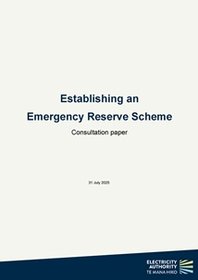Establishing an Emergency Reserve Scheme
Decision
Thanks to all who provided feedback. After considering all submissions we have decided to seek feedback on the proposed Code amendments necessary to establish an Emergency Reserve Scheme as an ancillary service in the electricity market.
Consultation
This consultation sought submissions on the rationale and high-level design for an Emergency Reserve Scheme to unlock industrial demand flexibility and boost security of New Zealand’s power supply ahead of next winter.
Under the proposed Emergency Reserve Scheme, organisations willing and able to reduce their power consumption on request - to make it available to the grid - could opt-in to the scheme and be paid to reduce their demand for short periods, where it makes commercial sense to do so.
The proposed Emergency Reserve Scheme would enable Transpower to access additional short-term capacity to prevent household and business disconnections on those rare occasions when market solutions fail to balance supply and demand.
We proposed to allow a wide range of power consumers to participate in the scheme, including large industrials, distributors, and groups of smaller business consumers. Broad participation would help businesses grow their capability and invest in new equipment.
Submissions
-
BusinessNZ Energy Council6 pages
-
Contact & Simply Energy5 pages
-
Counties Energy12 pages
-
Enel X10 pages
-
ERGANZ8 pages
-
Mercury1 page
-
Meridian9 pages
-
MEUG3 pages
-
Nova1 page
-
NZ Steel9 pages
-
Orion11 pages
-
Powerco1 page
-
SEANZ4 pages
-
Supa Energy2 pages
-
Transpower9 pages
-
Unison & Centralines4 pages
-
WEL Networks1 page
